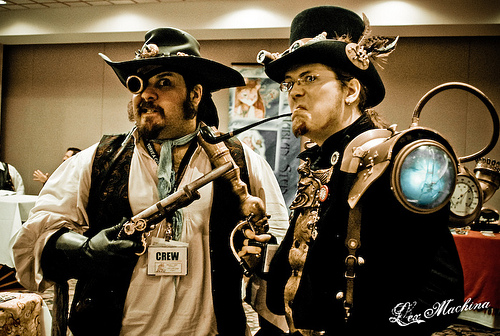Boswell’s Life of Johnson
I tell ya kids, check out Boswell’s ‘Life of Johnson.’ Those Victorians
knew how to rock. (Or whatever the 1700-ites were called.) Actually,
the book I got included a bunch of other writings by Boswell and Johnson.
One of which totally blew gaskets as far as The Wild Life is concerned:
“The Life of Richard Savage” by Johnson. Now there was a guy who lived large.
It’s hilarious to read of all the self-publishing by and his cohorts and attempts
to live as a decent person, and refusals to acquiesce in any way. This
guy just didn’t know how to stop partying either. He’d take subscriptions
for his zine ideas then party all the money away. Then he ended up
in debtor’s prison (just for one little coffeehouse bill) where he
rocked with the warden and was allowed to stroll the grounds
on his honor that he wouldn’t try to escape. He kept publishing
satires from prison, so that the local burghers
actually paid more to keep him there! He was an impoverished
bastard who actually would’ve been a nobleman and insisted on
living as a proper gentleman no matter what. He was a great
talker and lived very well from hand to mouth but kept rocking
too hard for his friends. (It’s hilarious to read between the lines
of all the formal writing.) In those days anyone with a mansion
kept a dozen indigent but highly polished friends in proper
conditions for gentlefolk. But times got more greedy and even
the rich folk wouldn’t help support the geniuses who inspired
them and the publishers refused to pay royalties and so
the famous writers would end up strolling the parks all
night due to having nowhere to sleep. But just before then
people knew how to take proper care of an artist, as in
the case of a retiring non-noble actress who gave one guy a yearly
annuity with no strings attached. But at the same time all
the nobility could hardly be bothered to put together enuf
for the artists who educated them to live on and they’d also
put all kinds of strings attached, then retract the pensions at the
first slight. Man, they sure knew how to string a bon mot back then.
And when the flaming got too hot there was always dueling!
*****
When arguing about want, respect and fashion with Boswell,
Johnson said “No, Sir; fine clothes are good only as they supply
the want of other means of procuring respect. Was Charles the Twelfth,
think you, less respected for his coarse blue coat and black stock?
And you find the King of Prussia dresses plain, because the dignity
of his character is sufficient.” Boswell writes that “I here brought
myself into a scrape, for I heedlessly said, “Would not YOU, Sir,
be the better for velvet embroidery?” Johnson. “Sir, you put an
end to all argument when you introduce your opponent himself.
Have you no better manners? There is YOUR WANT.”
*****
I’ve been reading this classic lately. What a ripsnorter of
the big old days. Ole Doc Johnson was right up the zinester’s
alley.
He was born into poverty and spent much of his early
writing career frequently homeless and in the company of
winos. When he and his pals had nowhere to stay, they didn’t
panhandle but instead spent the night walking about the square,
loudly discussing politics and the greatness of the Crown and
how it should be restored to its heights. The book gives several
recipes for how the young writer might live a civil life in London,
where it was ‘at’ in those days, by skipping certain meals and
taking others in what amounted to soup kitchens.
Johnson reminds me of Ignatious O’Reilly (Confederacy of Dunces)
or of Doug Holland or Karl Myers (in my imagination anyway).
He was a huge, very loud, deep-voiced, complete BEAR of
a fellow, who was very uncouth and who had many tics
and foibles that people never dared asked about but which
were much discussed out of earshot. He often rolled his
body when talking or getting ready to say something.
He also had nerve. One of the first big things
he did as soon as he had a penny was to write a famous
Dictionary. He gave himself 3 years to do it. No one could
believe it since it took the French 40 scholars 40 years to do French,
but he said that just showed you the ratio of a Frenchman to
an Englishman. He’s still considered just about the greatest
mind ever to see print. (As a kid he helped his teacher teach
and made it so rewarding for everyone that his mates would
CARRY this large boy to school for joy.)
Actually, the very first thing he did when he got a penny to
his name was to open his own school, which didn’t last long.
He risked it all immediately.
He was in poverty quite often but never desired a bailout
or a system that would give money to the poor, nor did he
talk badly about the class structure. He felt it to be vital.
He did however call any rascal, rich or poor, whatever they deserved
to be called, then carried an oak stick with him if need be.
He funded his Dictionary in what seemed the usual way back then
by getting backing from a few local bookstores. They wanted something
hot to sell and so would fund writers themselves. Bookstores
were the publishers. Why not vertically integrate? I don’t know
why more bookstores today aren’t more aggressively searching
out the best that can be written. They try every other trick to
get customers, with readings and such. Why do they sit passively
by while the *careerist* publishers give them the drivel that is
driving customers away? Of course, when Sam was tardy in delivery,
the booksellers came after him famously, asking for him to make good
on their subscriptions. (Gulp!)
I’ll reprint their clever lines here:
He for subscribers baits his hook,
And takes your cash; but where’s the book?
No matter where; wise fear, you know,
Forbids the robbing of a foe;
But what, to serve our private ends,
Forbids the cheating of our friends?
He considered himself to be lazy and seemed to have to force
himself to do anything, altho he did a huge amount.
I notice that he boarded several people for years
when he had money. Also that he himself stayed
for years at others homes. Class courtesy, in mansions,
I suppose. Just the same, what else did they have back
then but people? No TV no stuff. But I suppose it would’ve
been easy to get into enough cash-crunch with art and furniture
that you’d have nothing left to help support friends. Well,
I guess that taking care of friends was a BIG thing back then.
For one thing, no one moved. For another, the alternative
was bleak. No one could afford to say “Let the system take
care of it.” If your friend was in trouble, he’d perhaps die
if you didn’t help, even if he was educated and valuable.
One could quickly get on the outside of the ‘system’ back then
perhaps.
I like what he said about professions and how no one uses
very much of their attention while doing them, that it’s mostly
mechanical. (Someone had complained about a judge having a
business on the side, it being an unfair distraction to his duty.)
“No man would be a judge upon the condition of being
totally a judge.” There are more impt things to do, which of course
also give balanced perspective to the judging, make IT worth something.
(Have you dealt with a total-image judge these days? Burned out, cynical,
intolerant, worse than the cops, I’ve heard.)
Ha…Sam’s view doesn’t fit in with TQM. Not that the New World Order is
getting anything better of longterm value out of their panic,
besides the usual diseased results of any fever.



